Why does frozen shoulder appear in the first place?

Frozen shoulder, also known as adhesive capsulitis, is a condition characterised by stiffness and pain in the shoulder joint. The range of motion in the affected shoulder is significantly reduced, making it difficult to perform everyday tasks such as combing your hair or reaching into a cupboard.
But, how does this happen? Well, your shoulder is a ball and socket joint with a capsule of soft tissue providing support and stability. So, if your shoulder stays immobilized for a prolonged period of time, the soft tissue shoulder capsule tightens, therefore your risk of developing frozen shoulder increases. This is why it's so important to keep moving even when your shoulder hurts. If that is possible, that is.
For example, if you're recovering from surgery or if you've suffered a shoulder injury that required a cast, the likelihood of developing a frozen shoulder is much higher since you can't really move the joint.
What's also intriguing is that the frozen shoulder is more common in women than men and usually develops between the ages of 40 and 60. People with diabetes or thyroid problems are also at a higher risk of developing a frozen shoulder.
Does frozen shoulder pain get worse at night and why?

If you've ever suffered from a frozen shoulder, you know that the pain can be absolutely debilitating. The condition can be incredibly painful and the stiffness makes it hard to move the affected arm or shoulder, let alone fall asleep and get a full night of quality sleep.
But, why does the pain seem to get worse at night? Well, there are a few reasons why you might experience excruciating shoulder pain during the night.
First of all, when you lie down your blood flow slows down. This can lead to an increase in pain since the muscles and tissues are not getting the oxygen-rich blood they need to function properly.
Another reason why you might be experiencing more shoulder pain at night is because of the way you're sleeping. If you're not sleeping in sleeping positions that put minimal strain on your shoulder, you're likely to experience more pain which will disrupt your sleep quality.
Finally, it's worth noting that stress can also play a role in how much pain you're experiencing. When we're stressed, our bodies produce more of the stress hormone cortisol. This can lead to inflammation and an increase in pain.
What are the 3 stages of frozen shoulder?
Unfortunately, this thing doesn't go away over night. In fact, the condition develops through stages, and to reach full recovery, some may have to wait three or more years.
If you're “lucky”, you'll recover in about a year and a half, but even that is a very slow recovery.
Here's how you'll know how far along you are.
Pain & losing motion
The first stage, commonly known as freezing, is typically the most painful. The range of motion in your shoulder starts to decrease and the pain intensifies, making it hard to sleep or perform basic tasks.
This stage can last anywhere from three to nine months and is definitely the most painful stage out of all three.
Less pain but increased stiffness
The second, frozen stage, is when the pain starts to subside but the stiffness increases. This is because the shoulder capsule and muscles have started to stiffen and contract.
The good news is that during this stage, you won't experience as much pain as you did in the first stage. However, the increased stiffness can make it much more difficult to carry out everyday tasks, as your range of motion could be severely limited.
You can expect this stage to last anywhere from four to fifteen months.
Thawing
As you can tell from the name, the thawing stage is when the shoulder starts to “thaw” and the range of motion gradually starts to improve.
This is definitely the most welcome stage as it signals the beginning of the end. However, even though the pain and stiffness are improving, you might still experience some minor discomfort and a loss of strength in the shoulder.
As for how long this one will take – it depends. It could last about five months or so, but it could also last more than two years.
What are the symptoms of a frozen shoulder?
As for the symptoms, there really aren't many. But, they're more than noticeable.
Pain

For starters, pain is the most common symptom. And, it can be excruciating. The pain is often described as a dull ache that gets worse with movement, but also during the night.
It can also radiate down the arm and even make it hard to perform even the simplest, least shoulder-demanding tasks.
Stiffness
The second symptom is stiffness. This is probably one of the more frustrating symptoms because it can make it hard to do the things you love – whether that's playing sports, going for a run, or even just reaching up to grab some cookies off a shelf.
Weakness

Last but not least, you might also experience some weakness in the shoulder. This is particularly noticeable when trying to raise your arm above your head or lift something.
Other than that, there aren't really any other symptoms. But, these three are more than enough to make life pretty difficult.
How does a frozen shoulder affect your sleep?
We know that a frozen shoulder can affect your ability to carry out everyday tasks, but how does it affect your sleep?
For starters, the pain and stiffness can make it hard to fall asleep in the first place. Stiffness can also make it difficult to find a comfortable position to sleep in. And, pain… Well, it hurts. And, even if you somehow manage to get cosy and fall asleep, it's very likely you'll be woken up by the pain at some point during the night.
The vicious thing about this whole struggle is that not getting enough sleep can actually make the pain and stiffness worse. This is because when you don't get enough sleep, your body doesn't have a chance to repair and heal the damaged tissues.
So, not only is a frozen shoulder affecting your sleep, but a lack of sleep is also prolonging and exacerbating the symptoms. Not ideal, huh?
How to sleep with a frozen shoulder and get enough sleep?
We know the previous paragraph was scary, but don't lose hope. There are things you can do to ease the pain and sleep comfortably.
Undergo physical therapy
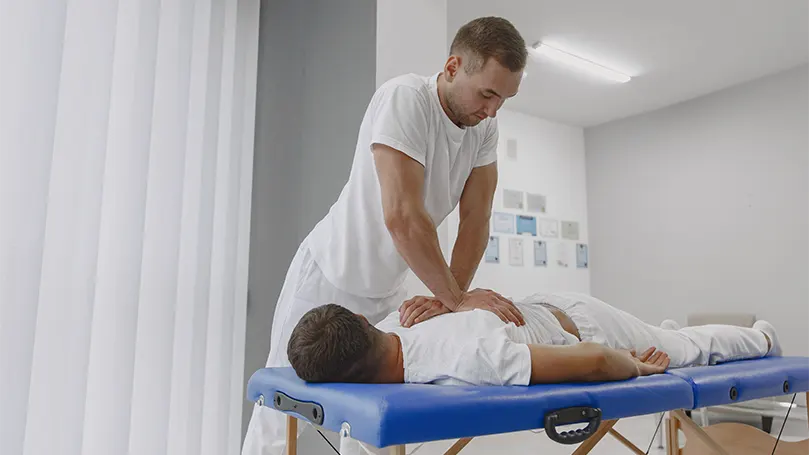
Your physician or physical therapist can help you come up with a physical therapy plan to ease the pain and improve your range of motion.
This will likely involve some exercises and stretches specifically designed for this condition. The journey may be long – but it will be effective.
Get a shoulder massage
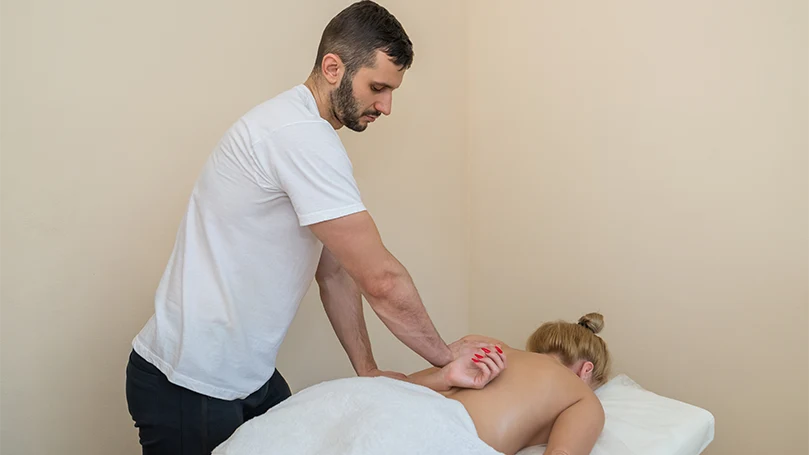
Apart from therapy, another thing that can help is a shoulder massage. This will help ease the pain and improve your range of motion.
If you can't afford a regular massage, you can ask a friend or family member to help you out.
Rest the shoulder throughout the day

While the movement is necessary, too much of it can actually make the pain and stiffness worse. So, make sure to take breaks throughout the day and rest the shoulder as much as possible.
Leave the movement for physical therapy and don't engage in any strenuous activity. And, if necessary, wear a shoulder brace to immobilise the shoulder and give it a break.
Do light stretching
As we've just mentioned, movement is necessary to ease the pain and improve your range of motion.
But, this doesn't mean you should go all out. Start slow with some light stretching and only do what doesn't hurt. After a while, you'll notice the results.
Consider anti-inflammatory medicine

Corticosteroids are often injected into the shoulder joint to help with the pain – especially during the early stages.
However, this doesn't work for everyone and is definitely not a long-term treatment solution. If you're in a lot of pain, over-the-counter anti-inflammatory medication can help ease the discomfort.
Ensure proper neck & head support
A pillow will be your best friend during this time. Make sure to choose one that supports the neck and head properly.
This will help you keep your head, neck and shoulder in the optimal position and prevent any aggravation of the symptoms.
Get a body pillow
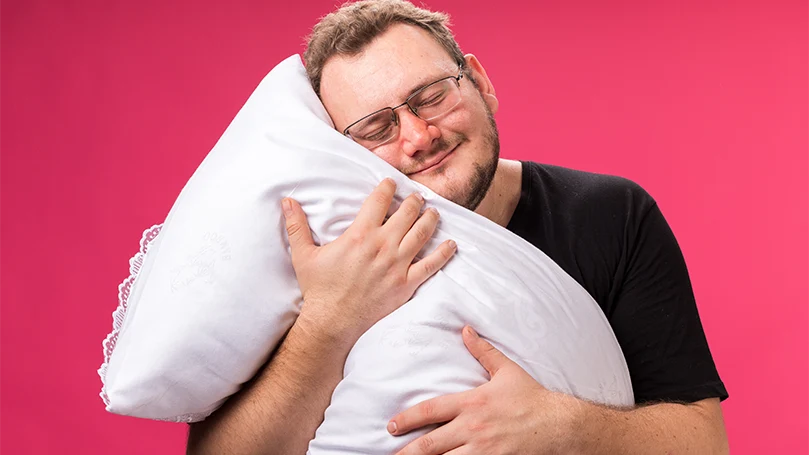
A body pillow will also help. Full body alignment provided by the body pillow is important for a good night's sleep – especially if you sleep on your side.
What you can also do is put the pillow behind or beside you so you don't end up rolling over on the affected joint.
Sleep on your side or back
When it comes to a frozen shoulder – sleep positions matter. The best sleep position is on your back with a pillow by the arm on the affected side.
This will help keep the shoulder in a neutral position and prevent rolling over to the affected side during the night.
If sleeping on your back is not an option, try side (lateral sleeping position) sleeping on the opposite shoulder. Just make sure you sleep on a comfortable, soft mattress to alleviate as much pressure as possible.
Use a heating pad/electric blanket to heat up your shoulder joint
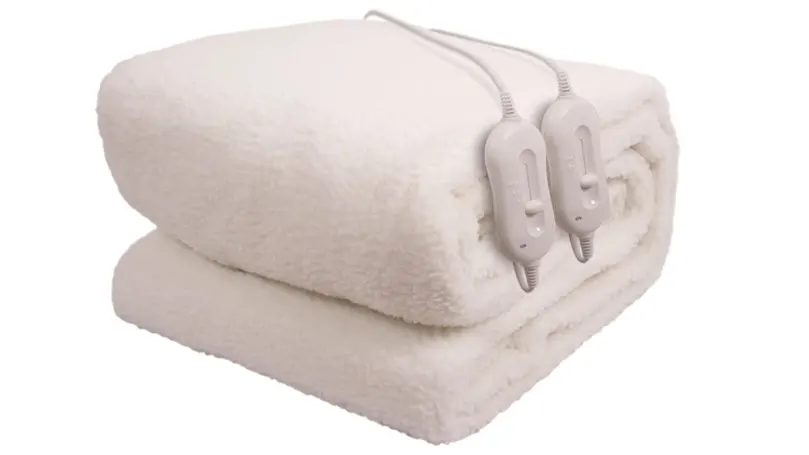
Heat is definitely your friend here. While it is usually not recommended to heat up inflamed joints (or a sore shoulder), in this case, it's actually beneficial.
Whether you use a heating pad (preferably one with a timer so it can shut off after a while) or a warm, wet towel – the warmth will offer some pain relief by making the muscles and soft tissues relax.
Do not sleep on the affected shoulder
Whatever you do, don't roll over to the affected side during the night. We know this is easier said than done, but believe us, this will only aggravate the pain, delay the recovery and make it harder for you to get a good night's sleep.
Avoid stomach sleeping
When you sleep on your stomach, your shoulders are drawn inside and up. That is not the optimal position – not even for a healthy shoulder joint. So, if you're dealing with a frozen shoulder, this position is definitely a no-no, as it will only make the pain worse.
How long does frozen shoulder last on average?
As we've said, this condition won't be over quickly. In fact, it may take up to 2 years for the symptoms to completely resolve.
In some cases, you could achieve full recovery within 15 months, but at the same time, you could end up with residual stiffness and pain for more than three or even four years.
Conclusion
As we've learned, a frozen shoulder can hurt a lot. And, it can last even longer, all depending on the individual and the stage of the condition. While there is no one-size-fits-all solution, following the tips we've outlined should help you sleep better despite this irritating condition and maybe even help speed up your recovery.
And now you know how to sleep with a frozen shoulder! Have we missed any important tips? What is your experience with sleeping with a frozen shoulder? Let us know in the comments.



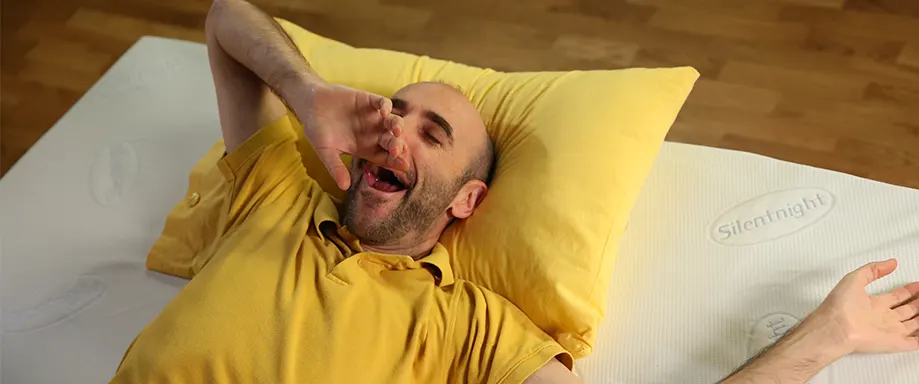













There are no comments yet
"*" indicates required fields